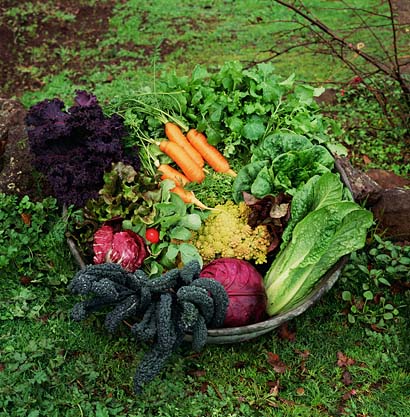You need to purchase premium potting mix for growing in containers. Container plants need watering more frequently than normal garden plants, and as a result the water leaches away fertilizers. So container grown plants benefit from liquid feeds on a regular basis throughout their growing season.

Watering
Because container plants are above ground the sun and wind will dry potting soils out quicker than plants grown in the ground. Water containers when the soil dries out to a depth of 1-2cm (1/2 inch).
Choosing the right plants
Many herbs make excellent container specimens. Container planting is ideal to try out some companion planting techniques. You'll have better success if your plant combinations are happy ones! Strawberries grow well in containers, particularly hanging baskets if they are not allowed to dry out.
Place the tallest plants along walls or trellises.
Many conventional gardeners find themselves with more than just a few plants growing in containers. Try growing a few pots together. Organic gardening is much more then just avoiding the use of chemicals on your garden.
1. Healthy Soil - This is probably the most fundamental aspect of any organic garden. Healthy soil that is replenished naturally will grow healthy food stuffs year after year. Organic fertilizers such as manure and composted garden, yard, and kitchen waste are easily recycled back into the earth creating nutrient rich soil that will grow all manner of healthy plants.
2. Avoid all chemical or synthetic fertilizers, pesticides, and herbicides.
3. Sustainable gardening practices allow your garden to become self sustaining.
4. Done properly organic gardens rely on natural organic cycles to remain healthy each and every year.
5. Use intensive planting practices to conserve water usage and help retard to growth of undesirable weeds. Intensive planting is simple spacing your plants close to together.
6. Use the concept of plant biodiversity to ensure that changes in growing conditions or plant disease does not lead to crop failure. Planting a variety of different plants will ensure that the loss of one plant will not jeopardize the overall garden food supply.
7. Use good watering and weeding practices. Capture and store rain water where possible to water the garden. From planting in the spring until fall harvest an organic garden is truly a part of it natural environment.




0 comments:
Post a Comment